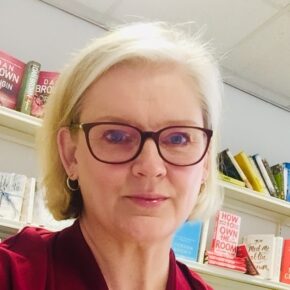Q – Hi Alison, and thank you for taking the time to be here. To start off, what do you think are the most important things to consider when launching a book?
Alison Barrow – Thanks for having me! When launching a book, it’s key to find the hook, the pitch, the ‘one-liner’ if you can. It seems reductive – so many years writing to be pulled into so few words – but it’s just a leaping-off point.
For S. J. Watson’s book, we arrived at: ‘Imagine how it would feel to wake every morning and find your memory had been wiped.’ And then you go from there…
Q – For someone with a debut novel in the making, what’s the first move to make in terms of PR? When should one start?
AB – For a debut, again it will help to find your one-liner.
What is it about your book that makes it best in that area? What was your leaping off point for writing? Are you drawing on personal experience? Do you have expert knowledge of the area in which you are writing?
The media and booksellers are on the hunt for new voices, but it’s essential to stand out from a very overcrowded market.
Q – What’s the most common fault that you see new writers looking for book deals making?
AB – I’m not an agent, and they are most often the diary contact for an author, but they tell me these faults are annoying: spelling mistakes in covering letters; an obviously generic covering letter (especially to ‘dear Sir/Madam’); and saying that all your relatives think your book is wonderful.
Yes, these things really happen.
Look in the back of books you love. Often authors credit their agent. You could make reference to that in a covering letter or show knowledge of other writers they represent. Then you know their taste echoes yours.
When we sign an author for a book deal then I will work with them directly. We talk and email and text all the time.
– Alison Barrow
Q – Are there any particular genres of writing that you think are feeling tired, having a resurgence or about to hit the mainstream?
AB – There is still a huge reader appetite for psychological crime thrillers, but the market is busy. Finding a unique hook or take which still remains credible and relatable to readers will be key. Genres like fantasy and science fiction are dominated by a handful of writers, but they’re difficult to find readers in unless you’re already talking in that community.
Historical fiction with an embedded mystery – think The Binding, The Familiars, The Miniaturist, The Mermaid and Mrs Hancock – is a rich seam right now.
Q – Do you deal only with agents or will you deal directly with an author?
AB – Authors come to us via agents. When we sign them for a book deal then I will work with them directly. We talk and email and text all the time. I hope to make it a hugely supportive and reassuring relationship as well as being a publicist alongside.
Q – I was lucky enough to meet you briefly when you were with Kate Atkinson at a signing, and she said you had been with her from the very beginning. How did you find each other and what is the secret to such a long and fruitful relationship between writer and publicist?
AB – I’ve worked with Kate Atkinson on all of her books. I was a junior publicist when I was assigned to her. We met for the first time in 1994 in Bettys tearoom in York.
She was very shy. Neither of us knew then how big she would become, how successful and how much admired. It’s my greatest privilege to be her publicist.
Early days, I protracted her as best I could from media intrusion after she won the Whitbread Prize, and everybody wanted her personal story.
Now, we know each other so well I can anticipate how she might react to events and approaches for interviews. I still protect her where I can while balancing the huge need for media coverage which will drive book sales.
Faber Academy has been a terrific launching place for writers, so it really is significant if a writer has experienced their professional approach.
– Alison Barrow
Q – How important is having a significant social media presence?
AB – It’s not so important to have a significant following on social media — lots of the novelists I work with aren’t there at all — but it helps if you can build a community of fellow readers and writers around you who will support, encourage, spread the word.
Many writers are great at this. Clare Mackintosh, Erin Kelly, Marian Keyes, Sarah Perry and Joanna Cannon are all good examples. A social profile won’t win you a book deal, however. A great book will!
Q – You’ve represented a few Faber Alumni. How did you find them? Do you look to Faber for possible new writers at all?
AB – Faber Academy has brought us some brilliant writers, and most came to us with an agent attached. It has been a terrific launching place for writers, so it really is significant if a writer has experienced their professional approach.
Again, it’s about standing out above writers in a busy publishing arena.
Q – Is there such a thing as a typical working day for you? What would it be like?
AB – Nope! Today I was up at 7. I sent about 20 emails before 8.30. I then drove to work and sat in an acquisitions meeting (where we choose which books to bid to publish) for 2 hours. Then we had a presentation to an ongoing author and her agent Jonny Geller (he’s a legend!), and then lunch with them.
A strategy meeting followed that, and then came writing a press release, briefing a press officer on a campaign, proof checking some promotional copy and consulting with an editor about a pitch she is making to an agent to acquire a novelist.
Several emails later I drove home, watered the pots in the back garden, made more emails and had a phone call with the author. Toast, tea, Faber Alumni webchat.
Tonight I’ll read a book I’m promoting this summer, as I never read books in the office. Always in my own time. Busy days, always – but I have the best job!
If the story is great and the voice is strong and distinctive, you’ve got a winning combination.
– Alison Barrow
Q – How long do you run a book campaign per novel?
AB – For me, the campaign runs as long as there is still interest in the book or writer. For example, for Before I Go to Sleep,I worked for 18 months on the hardback publication, and then about 2 years on paperback (and film).
For The Girl on the TrainI worked for about a year before first publication, then two years after that on the paperback and film.
Campaigns overlap each other. If there is ever an opportunity to partner a boom or writer with a media outlet, a bookshop, bookseller or reader, I won’t stop until that match has been made.
Q – What are the most important qualities you look for? Is it more about the style of writing or the story itself?
AB – For me, it is always, always the story. That’s what we refer to so often when talking up a book with others.
But style is also key, especially when the writer has their own distinct voice. That is then the key. If the story is great and the voice is strong and distinctive, you’ve got a winning combination.
Q – Alison, thank you for joining us!
AB – It’s been wonderful. To say one final thing, my son asked me a good question which made me think:
Why do lots of brilliant books not sell well or remain relatively unknown?
I would say that in order to put the wind under the sail of a book it needs ambassadors, people who will influence others to read, to recommend, to partner the book with the world of reading. It mustn’t always start with a great story well told.
The difference so often is in the hands of a publicist who should remain in the wings, handing the story out with passion and energy and not stopping until the appetite wanes.
Good luck in all your endeavours – you have great support at Faber Academy. Keep on keeping on!























